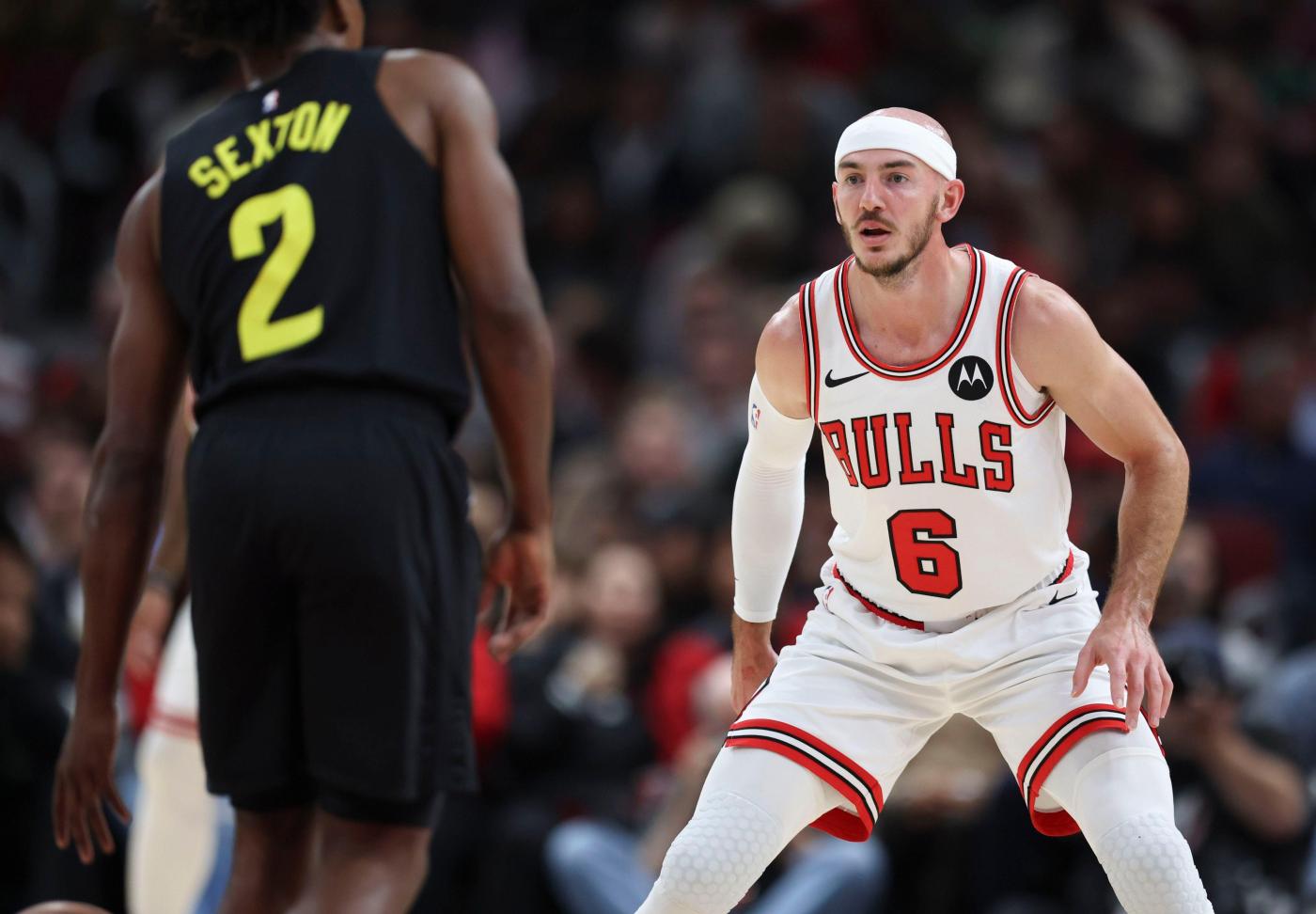
Why the Chicago Bulls don’t start Alex Caruso, despite the veteran guard’s stabilizing effect when he’s on the court
Chicago Bulls coach Billy Donovan already shook up his starting lineup this season when he replaced Patrick Williams with Torrey Craig after only five games.
As the Bulls attempt to claw out of a 3-5 hole, Donovan has considered another personnel question: Should Alex Caruso be starting as well?
Caruso has been one of the Bulls’ most consistent players since he signed with them in 2021. He’s a first-team All-Defensive selection, a poised offensive distributor and a vocal leader who offers as much instruction as any coach.
This has been a particularly strong start to the season for Caruso, who’s averaging 6.4 points on 54.3% shooting — including 80% inside the 3-point arc. He’s averaging 1.4 steals despite playing only 22.6 minutes per game. And when he checks into the game, the Bulls visibly settle down, a reflection of both his poise as a leader and his nullifying effect as a defender.
So why does he come off the bench?
For Caruso, the question isn’t ability or fit — it’s staying off the injury report.
“The most important thing with Alex is availability,” Donovan said. “He helps our team when he’s out there.”
Described as having “no regard for his own personal safety,” Caruso relies on his instinct to put his body on the line to disrupt opponents.
Over the last two seasons, the Bulls landed on a “sweet spot” for Caruso: Keep his playing time under 30 minutes.
Caruso averaged a personal-high 28 minutes per game in 2021-22, but he also missed 41 games that season because of injuries. Last season Donovan shaved Caruso’s rotations to an average of 23.5 minutes, and he was available for 67 games.
Donovan considered moving Caruso into the starting lineup, especially when the team was searching for a point guard in the preseason. But it’s virtually impossible to start a player without playing him for at least 15 minutes in the first half.
The Bulls typically prefer to stagger Caruso’s playing time to give him more minutes in the second half. An exception was Monday’s 130-113 victory against the Utah Jazz, in which Caruso played 12 minutes in the first half and then logged eight in the second half.
If it’s a choice between starting or closing with Caruso, Donovan usually will choose to have him on the court in the final minutes.
This makes sense given Caruso’s defensive prowess. Although Caruso could buoy the opening rotation to set a tone in the first quarter, he’s more critical in the fourth quarter of a close game as a shutdown defender who can neutralize the opponent’s best scorer.
“I’m not saying he can never (start), but history shows us that if that’s done over a long period of time, it becomes challenging,” Donovan said. “That’s not to sit there and say that we won’t get into an overtime game where he exceeds (30 minutes). But the totality of his minutes night in and night out, when he starts getting consistently close to 30 minutes a night, that’s when he has difficulty.”
Caruso — who has played more than 30 minutes only once this season — already has landed on the injury report twice. He tweaked an ankle during a preseason practice, which caused trainers to shut him down for the next exhibition game as a precaution.
And on Saturday in Denver, Caruso crashed to the ground after colliding with Nuggets forward Aaron Gordon while throwing down a dunk and banged his right elbow and upper arm against the hardwood. He played only five more minutes in that game.
Although Caruso said there’s no structural damage or concern about a long-term injury, trainers strapped a hot pack to his arm every time he exited the court Monday against the Jazz.
These small knocks reflect the tightrope act required to keep Caruso available without deterring his style of play.
That doesn’t mean Caruso won’t ever start a game this season. But if the Bulls want consistency this season, it means bringing Caruso off the bench — in order to keep him on the court at all.
()


